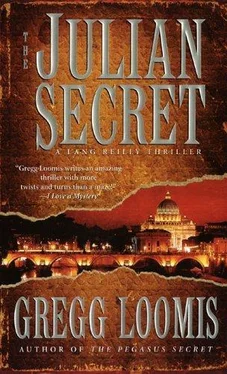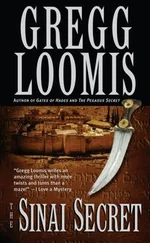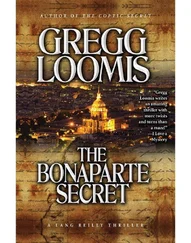Gregg Loomis - The Julian secret
Здесь есть возможность читать онлайн «Gregg Loomis - The Julian secret» весь текст электронной книги совершенно бесплатно (целиком полную версию без сокращений). В некоторых случаях можно слушать аудио, скачать через торрент в формате fb2 и присутствует краткое содержание. Жанр: Триллер, на английском языке. Описание произведения, (предисловие) а так же отзывы посетителей доступны на портале библиотеки ЛибКат.
- Название:The Julian secret
- Автор:
- Жанр:
- Год:неизвестен
- ISBN:нет данных
- Рейтинг книги:4 / 5. Голосов: 1
-
Избранное:Добавить в избранное
- Отзывы:
-
Ваша оценка:
- 80
- 1
- 2
- 3
- 4
- 5
The Julian secret: краткое содержание, описание и аннотация
Предлагаем к чтению аннотацию, описание, краткое содержание или предисловие (зависит от того, что написал сам автор книги «The Julian secret»). Если вы не нашли необходимую информацию о книге — напишите в комментариях, мы постараемся отыскать её.
The Julian secret — читать онлайн бесплатно полную книгу (весь текст) целиком
Ниже представлен текст книги, разбитый по страницам. Система сохранения места последней прочитанной страницы, позволяет с удобством читать онлайн бесплатно книгу «The Julian secret», без необходимости каждый раз заново искать на чём Вы остановились. Поставьте закладку, и сможете в любой момент перейти на страницу, на которой закончили чтение.
Интервал:
Закладка:
THIRTY-SEVEN
Rome
The Vatican
April 28, 1944
At the same time Pius XlI was conducting a meeting of the Pontifical Commission for the Vatican City State, Waffen SS Sturinbahnfilhrer Otto Skorzeny was pretending to be just one more German taking pictures of St. Peter's Square. Even had it not been for blue eyes the color of glacial ice and the dueling scar that circled his right cheek, the ordinary Wehrmacht troops along the border of the Holy City would have shown him even more deference than the black SS uniform merited.
The rugged good looks, the soft Austrian accent did nothing to conceal an air of one who commands as though he were born to lead men into desperate ventures. One of those ventures, the rescue of Il Duce, had resulted in a notoriety that made him uncomfortable. A soldier's place was on the front lines, not the headlines.
Having his name in the papers was even more disquieting. At least he had successfully declined to allow photographs. Anonymity was like virginity: once lost, never regained.
He had had no choice in the matter. His Fuhrer had ordered him to make himself available to Herr Goebbels's press corps, and he had followed those orders as would any good soldier. Fortunately, fame was indeed fleeting and the civilian public's brief attention quickly focused elsewhere. Even now, though, months later, a number of the troops called him by name as they saluted.
With invasion of France by the Allies imminent, he had requested a command similar to the one he had had on the Eastern Front until he had been wounded in 1942. Instead, he had been summoned to Hitler's home atop the mountains of Berchtesgaden, where the Fuhrer himself had explained the present mission and its importance. Although Skorzeny would have preferred a return to combat, the Fuhrer had been very persuasive.
Today Skorzeny was reconnoitering another raid.
Through the viewfinder of the Zeiss camera, he watched the Swiss Guards. Although their medieval pikes and uniforms provided more show than protection, he knew the men were trained in the use of modern weapons and prepared to die defending their employer, the Pope.
He hoped that would not be necessary, although he could not imagine them standing by as the Pope was taken prisoner.
He trained the camera on the area surrounding the obelisk. A souvenir of Rome's conquest of Egypt, it had been brought to Rome in the first century, A.D., although it had been moved to its current location only when the present St. Peter's Basilica was under construction in the sixteenth century. Its previous location and the significance of that spot was, Skorzeny understood, marked by an inset in the paving of what was now a fairly busy roadway between the southern edge of the basilica proper and the beginning of the Bernini colonnades. Two costumed guards were stationed here to prevent the unauthorized from entering the Vatican grounds.
If Skorzeny's information was correct, the subject of his interest was Just beyond that entrance.
If it existed. He was uncertain exactly what the enigmatic inscription on the wall at Montsegur had meant. Even when translated by the head of the Classics Department at the University of Berlin, it made little sense and had even less significance. Who cared what crimes had been alleged against the son of a Jewish carpenter two thousand years ago? Non-Jewish, he mentally corrected himself. The Nazi party had done extensive research and produced conclusive evidence that Christ was not a Jew-conclusive for any German who valued his life or liberty, anyway.
Still, who cared?
Der Fuhrer, that's who. Anything dealing with religion or the occult fascinated Hitler. That, of course, was why Skorzeny was here instead of fighting the British and Americans as they battled their way up the Italian boot or helping fortify the French coast. Kidnapping the Pope was another matter. The Christian world would shriek its protest just as all of Europe had when the Fuhrer had marched into the Rhineland, Austria, the Sudeten, and then all of Czechoslovakia. And with about as much effect. In the meantime, His Holiness could be ransomed off for the greatest treasure in the world, the priceless objects of art in the Vatican. After nearly five years of war, Germany's treasury could use the infusion of cash such riches would bring.
And Hitler would have a surfeit of religious artifacts, including whatever that emperor… Julian, the Emperor Julian, had hidden.
He let the camera fall loose to hang on the strap around his neck. The information. Intelligence provided by trained military observers was frequently misleading or downright wrong. Here, he was relying on the observations not of a soldier, not even a partisan civilian, but of Ludwig Kaas, the financial secretary to the Reverenda Fabbrica, a mere clerical bureaucrat.
Of course, Kaas had more incentive than most to get his facts straight. The families of his two siblings and his aged mother, all in Germany, to be exact. No one had actually threatened them, not in so many words. But when Hitler and his inner circle had heard the rumors of excavation below the basilica, they searched the voluminous records of the Third Reich until they found someone in the Vatican, someone who might be, shall we say, subject to patriotic persuasion.
Kaas had produced the information sought: entrances, number of guards on duty at any given time, and the location of the object of German interest. The priest had not even asked why the data was requested. Perhaps he knew. More likely, he wanted to make sure he did not. Well, the good father's self-delusion of innocence wasn't going to last much longer. The priest was scheduled to give Skorzeny a tour of the area beneath the basilica tomorrow morning.
After that, there would be no reason to delay the operation.
CHAPTER THIRTY-EIGHT
Rome
Hotel Hassler
The present
When Lang awoke the next morning, he sat up in bed, reviewing what, if anything, he had learned the night before. The inscription on the wall had been obliterated, but by whom? Historical revisionism and political correctness were at least as old as the Caesars. An emperor's name, Julian's inscription, either could have been removed. Unless Lang could manage to read. a carving intentionally destroyed, he would never know what, if anything, Skorzeny had found or the motive for whoever had killed Don and Gurt and now had him in their homicidal sights.
But how do you read…?
Inspiration is like a broadcast: free, but you just have to be tuned to the right station.
Hurriedly, he showered and dressed. Checking the charged status of both his own cell phone and the BlackBerry Reavers had given him, he slipped both in his pocket, counted his cash, and decided he needed more and left the room. A few minutes later, he was walking briskly toward the rail station. One of the many things Lang loved about Rome was its mix of history. A block from the station was the massive Baths of Diocletian, emperor at the end of the third century and author of the Roman equivalent of Boston's Big Dig. Except the emperor's huge public bathhouse had actually been completed in a single lifetime. Straddling both modern and ancient, a seventeenth-century building housed Rome's archaeological museum, its location forming a triangle with the baths and rail station.
Lang pulled open the museum's glass doors, entering a small lobby, and approached the ticket booth.
"Curator?" he asked.
"Five euro," the woman behind the glass said, pointing to a price list in five languages prominently displayed behind her. Lang shook his head. "No, no. I'd like to see the curator, not the museum."
"If you no want see museum," she challenged, "why you here?"
Once again, Lang became aware of how efficient the barrier of language could be. He spoke little more than memorized phrases of Italian, and her English was little better. "It's too much money,"
Читать дальшеИнтервал:
Закладка:
Похожие книги на «The Julian secret»
Представляем Вашему вниманию похожие книги на «The Julian secret» списком для выбора. Мы отобрали схожую по названию и смыслу литературу в надежде предоставить читателям больше вариантов отыскать новые, интересные, ещё непрочитанные произведения.
Обсуждение, отзывы о книге «The Julian secret» и просто собственные мнения читателей. Оставьте ваши комментарии, напишите, что Вы думаете о произведении, его смысле или главных героях. Укажите что конкретно понравилось, а что нет, и почему Вы так считаете.












